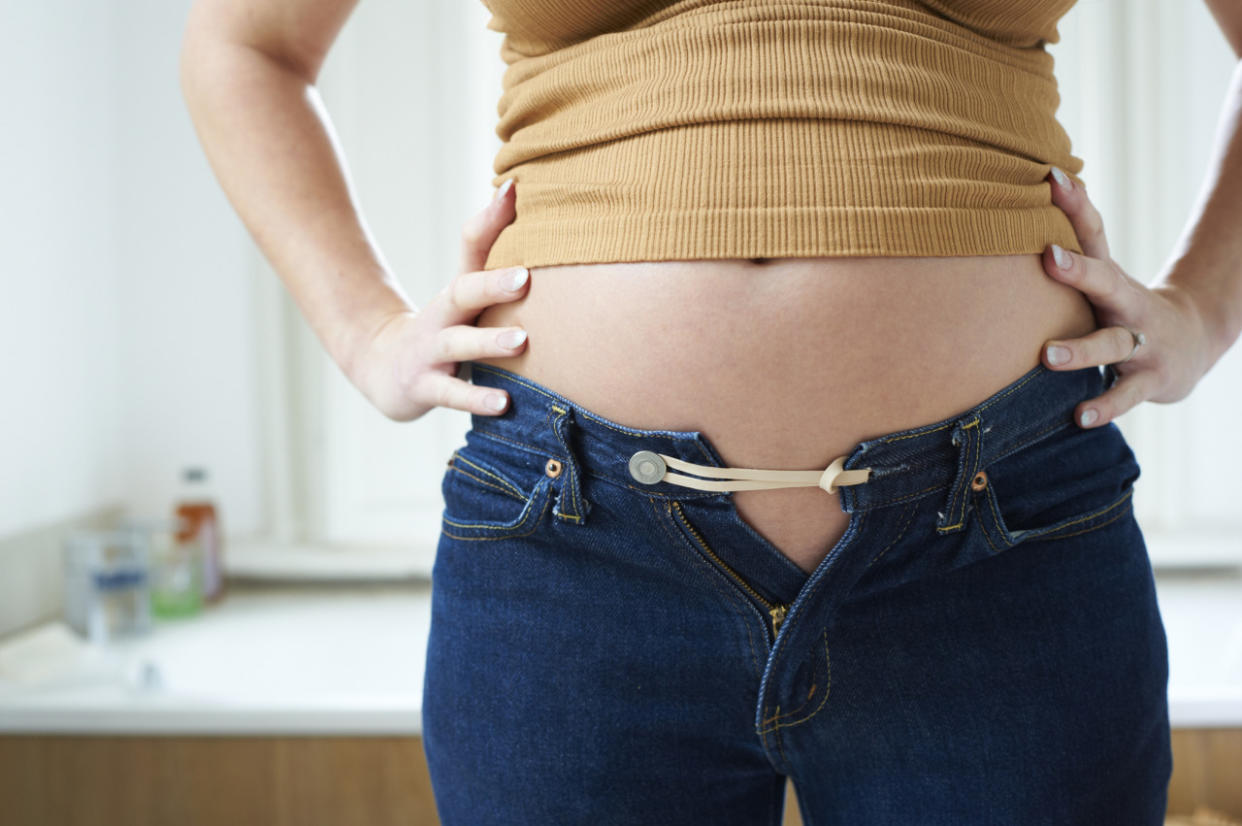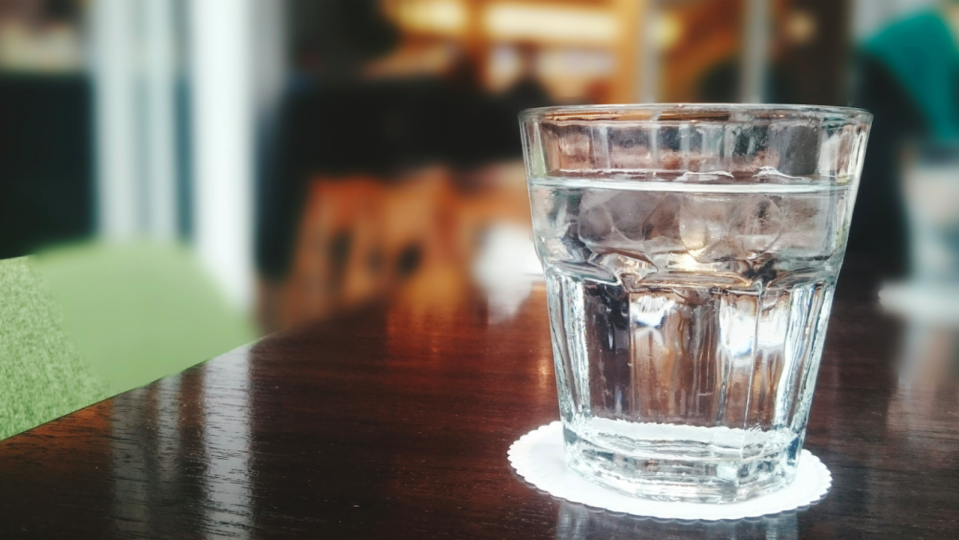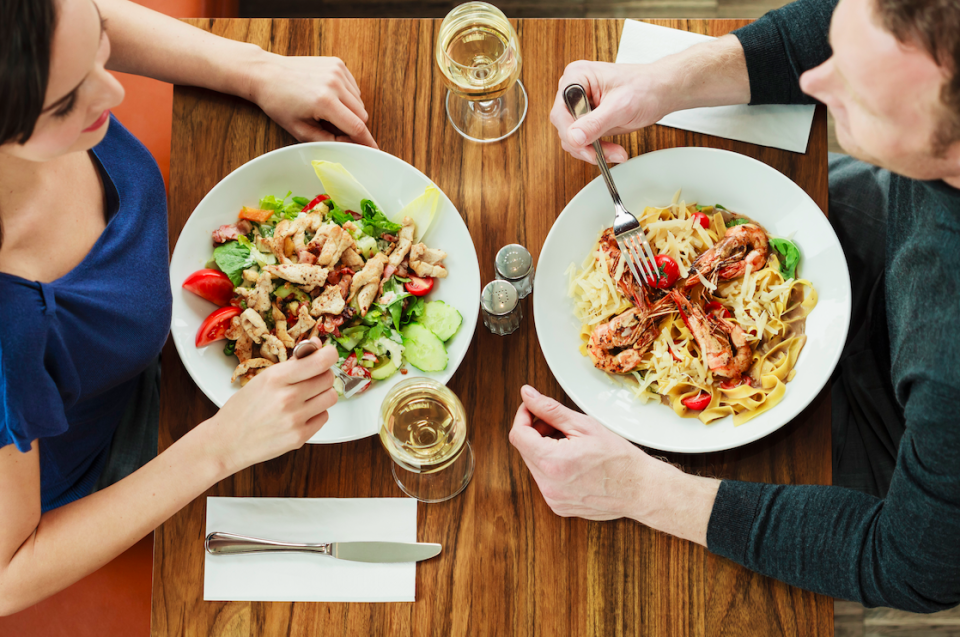13 ways to beat the post-food belly bloat

Beat the post-dinner belly bloat [Photo: Getty]
You’ve just scoffed the yummiest of lunches and are feeling deliciously full and happy. But as with so many of life’s little pleasures, there’s bound to be a bit of pain, literal and metaphorical, as the inevitable post-food bloating kicks in.
Being bloated sucks. You have to question what clothes you’re going to be able to wear – goodbye slinky dress, hello baggy jumper, you feel sluggish and someone on the tube is likely to offer you a seat thinking you’re three months preggo. Doh!
And never is the blasted bloat more troublesome than after eating. In a recent survey 25% of respondents said that post-meal bloating has ruined a special or important occasion.
“Bloating can affect anyone and it can be incredibly uncomfortable and annoying, especially if you’re wearing something that doesn’t hide the bloating particularly well or are planning to go out afterwards and want to look your best,” explains Doctor Clare Morrison, GP at www.MedExpress.co.uk
But there are certain anti-puffing tricks you can try to minimise that post-food belly bloat. Behold.
Don’t overeat
Yeah, we know you want to finish everything on your plate, us too, but eating more than you need will only increase your bloating. “If you feeling full, don’t force yourself to finish what’s on your plate. You can also try eating slower and chewing your food well; when you eat fast you swallow excess air which can lead to gas retention,” explains GP Clare Morrison.

[Photo: Getty]
Reduce your portion size
Yeah, we know harsh, but the stomach flattening results will be worth it no? “Instead of three large meals per day, which can be hard on your digestive system, smaller portions more often could be the way forward. Eating more frequently also helps control blood sugar and manages hunger. Remember to eat what your body needs, not what you want!” explains Lisa Roukin from www.myrelationshipwithfood.com
Eat slowly
The temptation to gobble your food may be overwhelming, but it’s much better for your gut to take things slow. “Eating quickly and not chewing your food properly can cause a build up of air that leads to too much gas in the intestine,” explains Lisa Roukin. “Your meals should last at least 30 minutes, rather than the 5/10 minutes we’re used to giving ourselves. Taking this time to enjoy will allow you to taste the food and meal times become more satisfying. And remember, digestion starts in the mouth so chewing properly means your system doesn’t need to work so hard to break down the food.”
Cut the salt
Sure it makes chips salty-delicious, but did you realise salt can also up the ante on bloating? “Try to avoid foods high in salt because, as well as the plethora of long-term health problems that can come with a high salt diet, salt can cause water retention which can leave you feeling quite bloated,” explains Doctor Clare Morrison.
Do a pre-breakfast workout
“Exercising in the morning before breakfast can prevent the build up of gas which leads to a bloated stomach. Even just 15-20 minutes of power walking or jogging can work wonders on your system,” explains Dr. Tatiana Lapa
Go Pro
Because it’s all about the friendly bacteria. “lf you can, have a probiotic yoghurt every morning,” suggests Dr Tatiana Lapa. “The live ‘friendly bacteria’ helps move food though your stomach and gut which can prevent bloating. If you don’t like yoghurt; Acidophilus supplements are a great way of ensuring you get your daily dose.”

[Photo: Getty]
Up your water intake
We know the water drinking drill. “If you’re feeling bloated you might think it is best not to drink, but not drinking actually makes fluid retention worse, in the same way that crash dieting makes the body hang onto fat because it thinks it’s starving,” explains Dr. Marilyn Glenville, author of Natural Alternatives to Sugar.“I’d recommend a herbal tea, such as Dandelion tea, as this contains a natural diuretic that helps you restore a healthy fluid balance. And avoid gas making fizzy drinks.” For obvious reasons!
Get a sunshine hit
Who knew getting some sun could cure a bloated tum? “Vitamin D, also known as the sunshine vitamin, has been shown to help stabilise bowel movements and ease symptoms of IBS. If you are concerned that you’re not getting enough vitamin D, especially if you do not have the chance to get out in the little bit of sunshine we get each year, then I would suggest taking a supplement,” says Marilyn.

[Photo: Getty]
Stretch it out
You might feel like lying on the sofa doing nothing, but nothing beats the post-meal bloat better than movement. “Get moving, by walking or doing toe touch stretches. Gravity will work to get the gas out of your body,” says fitness and wellbeing expert Ramona Braganza. She suggests some simple exercises to reduce a puffy tummy. “Twisting exercises can help push air out of digestive system, this can be done in a chair or on the ground,” she says. “Sit feet facing forward then rotate torso to the right and reach around to hold back of the chair, then repeat other direction.”
Go minty
Forget that post-meal coffee, drink peppermint tea instead. “Peppermint tea can be very beneficial for your digestive system and help alleviate problems like bloating,” says nutritionist Zoe Martin at Discount Supplements. “Peppermint has relaxant and antispasmodic properties and can help relieve cramps and spasms leading to stomach discomfort and bloating.”
Chew It
Didn’t your mum always tell you to chew your food properly. Turns out she might have been onto something. “Try to chew each mouthful until the food is liquid, this will help to make sure the food is properly digested. Also, when you take more time to thoroughly chew and taste your food, your snack or meal becomes more satisfying and so will help to prevent you from over eating,” explains Dr. Marilyn Glenville.
Get to the root of the problem
“If you find you’re constantly bloated after eating, you may well have a food intolerance,” suggests nutritionist Zoe Martin. “Things like dairy, gluten and even brown rice can cause stomach discomfort and intolerances in individuals. Try taking certain foods out of your diet for 10-14 days and seeing if you notice a difference.”

[Photo: Getty]
Avoid trigger foods
For a sleeker silhouette steer clear of certain stomach bloating foods. “There are seven key foods that often cause bloating in many people. Firstly, fruits including apples and watermelons cause bloating because they contain fructose. You may suffer from ‘fructose malabsorption’ and find you bloat after eating them. Secondly, although garlic is a great antibacterial, it contains bloating producing fructans. Beans contain alpha-galactosidase sugars which can cause gas and broccoli can cause bloating for some people as it belongs to cruciferous vegetable family. Lentils are very high in fibre that can make you gassy if you consume too many. To avoid this, you should soak lentils well and opt for light coloured ones as they’re a little lower in fibre than the darker ones. Finally, some sweeteners such as sorbitol, mannitol and xylitol can cause digestive problems,” advises Dr Ayesha Akbar, Consultant Gastroenterologist at St Mark’s Hospital.
What are your tips for reducing a bloated belly? Let us know @YahooStyleUK
Aloe vera juice: Why we should all be drinking it
10 gluten free substitutes that taste surprisingly delicious


